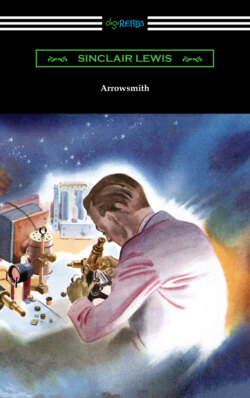Читать книгу Arrowsmith - Sinclair Lewis - Страница 14
На сайте Литреса книга снята с продажи.
Chapter III
ОглавлениеI
John A. Robertshaw, John Aldington Robertshaw, professor of physiology in the medical school, was rather deaf, and he was the only teacher in the University of Winnemac who still wore mutton-chop whiskers. He came from Back Bay; he was proud of it and let you know about it. With three other Brahmins he formed in Mohalis a Boston colony which stood for sturdy sweetness and decorously shaded light. On all occasions he remarked, “When I was studying with Ludwig in Germany—” He was too absorbed in his own correctness to heed individual students, and Clif Clawson and the other young men technically known as “hell-raisers” looked forward to his lectures on physiology.
They were held in an amphitheater whose seats curved so far around that the lecturer could not see both ends at once, and while Dr. Robertshaw, continuing to drone about blood circulation, was peering to the right to find out who was making that outrageous sound like a motor horn, far over on the left Clif Clawson would rise and imitate him, with sawing arm and stroking of imaginary whiskers. Once Clif produced the masterpiece of throwing a brick into the sink beside the platform, just when Dr. Robertshaw was working up to his annual climax about the effects of brass bands on the intensity of the knee-jerk.
Martin had been reading Max Gottlieb’s scientific papers—as much of them as he could read, with their morass of mathematical symbols—and from them he had a conviction that experiments should be something dealing with the foundations of life and death, with the nature of bacterial infection, with the chemistry of bodily reactions. When Robertshaw chirped about fussy little experiments, standard experiments, maiden-aunt experiments, Martin was restless. In college he had felt that prosody and Latin Composition were futile, and he had looked forward to the study of medicine as illumination. Now, in melancholy worry about his own unreasonableness, he found that he was developing the same contempt for Robertshaw’s rules of the thumb—and for most of the work in anatomy.
The professor of anatomy, Dr. Oliver O. Stout, was himself an anatomy, a dissection-chart, a thinly covered knot of nerves and blood vessels and bones. Stout had precise and enormous knowledge; in his dry voice he could repeat more facts about the left little toe than you would have thought anybody would care to learn regarding the left little toe.
No discussion at the Digamma Pi supper table was more violent than the incessant debate over the value to a doctor, a decent normal doctor who made a good living and did not worry about reading papers at medical associations, of remembering anatomical terms. But no matter what they thought, they all ground at learning the lists of names which enable a man to crawl through examinations and become an Educated Person, with a market value of five dollars an hour. Unknown sages had invented rimes which enabled them to memorize. At supper—the thirty piratical Digams sitting at a long and spotty table, devouring clam chowder and beans and codfish balls and banana layer-cake—the Freshmen earnestly repeated after a senior:
On old Olympus’ topmost top
A fat-eared German viewed a hop.
Thus by association with the initial letters they mastered the twelve cranial nerves: olfactory, optic, oculomotor, trochlear, and the rest. To the Digams it was the world’s noblest poem, and they remembered it for years after they had become practicing physicians and altogether forgotten the names of the nerves themselves.
